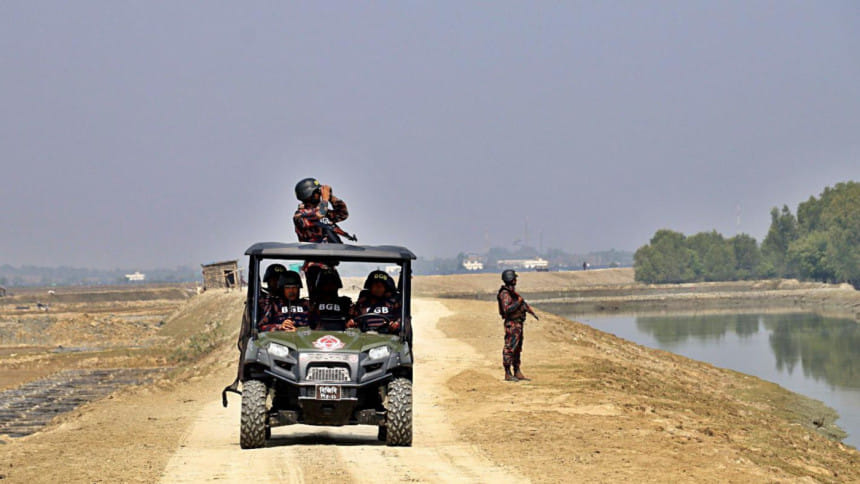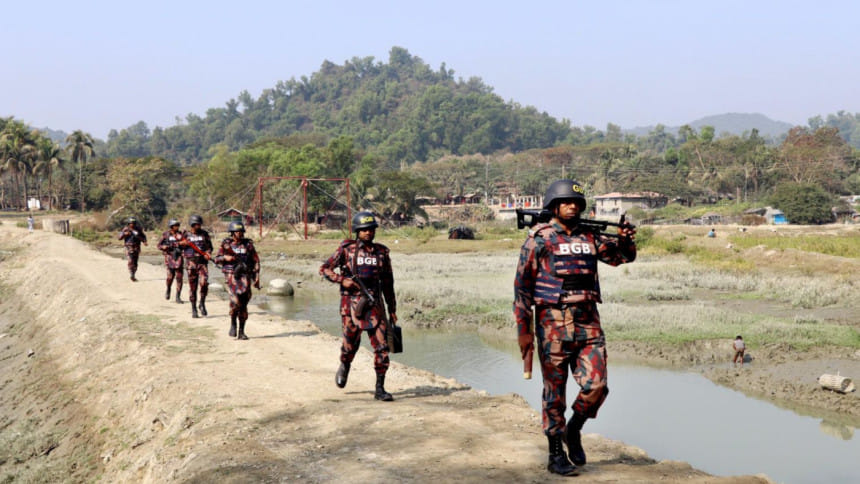Growing concern of fresh Rohingya influx into Bangladesh

There is growing concern along border areas in Cox's Bazar of a fresh Rohingya influx into Bangladesh from the conflict zone in Myanmar's Rakhine, due to recent attacks on the Muslim ethnic group.
Thousands of Rohingya people are waiting to enter Bangladesh, having fled the war between the Arakan Army and the Myanmar troops after being subjected to brutal attacks by both parties, claimed relatives of the afflicted people living at the camps in Cox's Bazar.
The Daily Star reported on August 7 that at least 31 Rohingya people drowned in the Naf river and the estuary of the Bay of Bengal as two boats capsized while carrying refugees to Bangladesh from Rakhine.

After their bodies were recovered on August 5 and 6, they were buried by locals in Teknaf on the Bangladesh side of the border.
These incidents, especially the readiness to take this perilous journey by sea, hint at the desperation of these Rohingya people to enter Bangladesh.

In a statement on August 9, Médecins Sans Frontières (MSF) said in the four days leading up to August 7, MSF teams in Cox's Bazar treated 39 Rohingya people for violence-related injuries.
Many had mortar shell injuries and gunshot wounds. They had crossed the border from Myanmar in search of safety.
Mortar shell injuries and gunshot wounds indicate the worsening humanitarian situation for the Rohingya in Rakhine state, MSF reported.
Reuters reported on August 10, quoting several witnesses, that a drone attack on Rohingya people fleeing Myanmar killed many dozens of people, including families with children.
The news agency reported, "Four witnesses, activists and a diplomat described drone attacks on Monday (August 5) that struck down families waiting to cross the border into neighbouring Bangladesh. Three of the witnesses told Reuters on Friday that the Arakan Army was responsible, allegations the group denied. The militia and Myanmar's military blamed each another."
Many of the Rohingya from Myanmar have entered Bangladesh and are living at different camps in Teknaf, said Kamal Hossain, chairman of FDMN RC, a Rohingya rights organisation working at the camps.
"They have been facing extreme scarcity of food and other essentials since they entered Bangladesh illegally," he said. "Thousands of Rohingya people are still waiting on the bank of the Naf river and other nearby places in the Maungdaw township in Rakhine to enter Bangladesh as the situation has gotten severe."
Seeking anonymity, a public representative said there was no way for boats from Myanmar to enter Bangladeshi waters. However, Bangladeshi boats, involved in smuggling fuel and other items to Myanmar, carry Rohingya people into Bangladesh along with yaba and crystal meth, he added.
Among the locals in Teknaf, concern about this impending Rohingya influx is rising. Yesterday, the Anti-Discrimination Student Movement in Teknaf formed a human chain in the upazila demanding a stop to any kind of infiltration of Rohingya people in Bangladesh.
Ziaur Rahman Zihad, chairman of Teknaf Sadar Union, said people in his area are concerned about the news of Rohingya infiltration. They are fearing further decline of the already deteriorated law and order situation in the upazila due to the Rohingya influx of 2017.
Lt Colonel Mohiuddin Ahmed, commanding officer of Border Guard Bangladesh (BGB) battalion in Teknaf, said they are remaining vigilant on the Naf river and along the land border with modern technology to prevent any kind of infiltration. They have already turned back many boats carrying Rohingyas, he said.
Lt Commander Suaib Bikash, media officer of Coast Guard East Zone, said they increased patrolling in the Bay of Bengal to prevent any illegal trespassing.

 For all latest news, follow The Daily Star's Google News channel.
For all latest news, follow The Daily Star's Google News channel. 



Comments